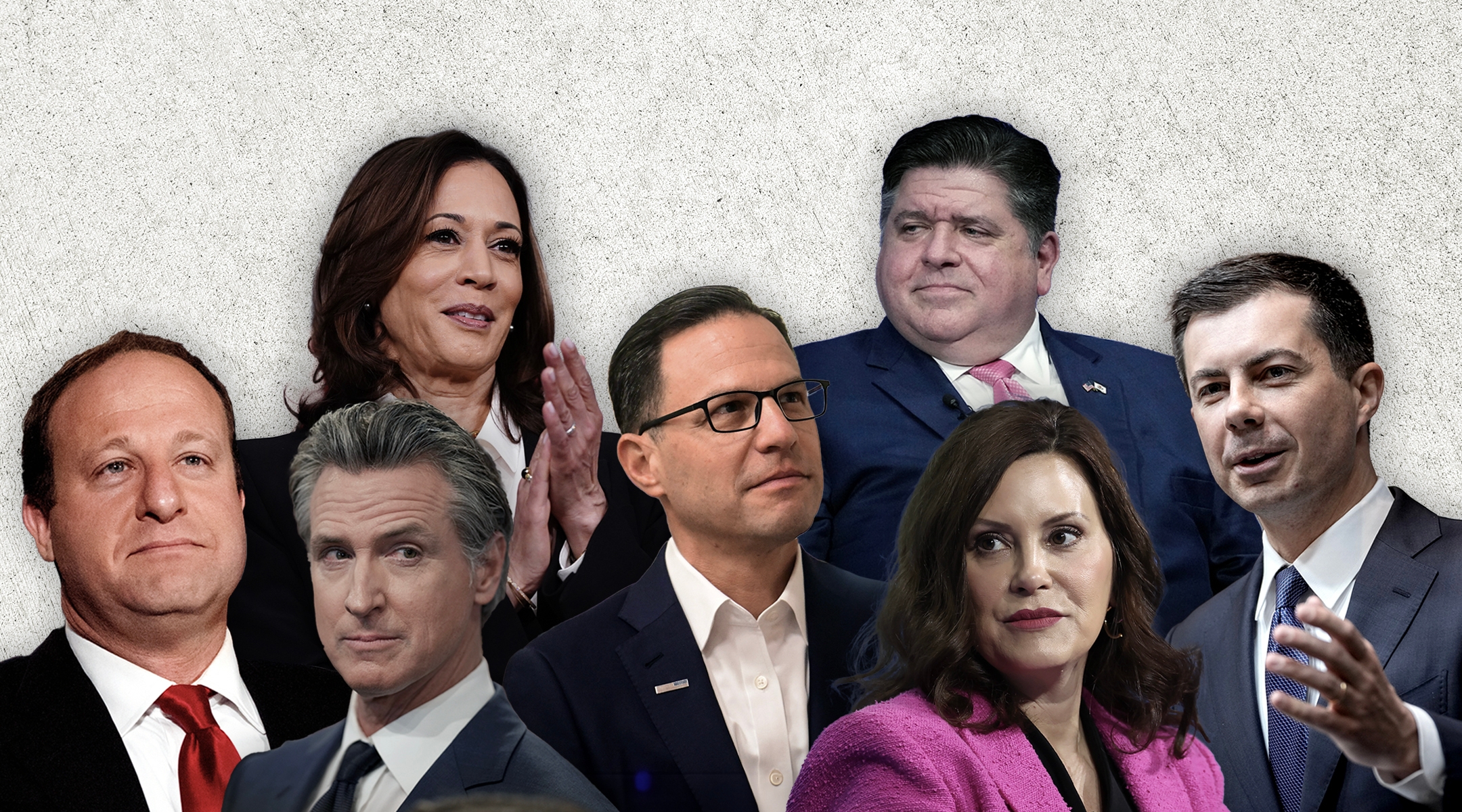UPDATE: Joe Biden announced on July 21 after weeks of pressure from leading Democrats that he would end his reelection campaign. He endorsed Vice President Kamala Harris as his replacement, which will be officially decided at the Democratic Party’s convention in August.
WASHINGTON — Calls for President Joe Biden to relinquish his presidential nomination have proliferated since his disastrous debate performance last week.
On Tuesday, for the first time, a Democratic elected official, Rep. Lloyd Doggett of Texas, echoed the demand. Aside from Doggett, most of the appeals have come from a range of liberal-leaning publications and pundits.
Biden insists he’s going nowhere, and has sent out campaign surrogates to make the case that the 81-year-old president is up to the job. Nonetheless, chatter about potential successors has only increased. Marianne Williamson, the Jewish self-help author who challenged Biden in the primaries, reopened her campaign this week and called for an open convention.
A few more names are in the mix, from Vice President Kamala Harris to a number of governors and other officials, and they all have Jewish connections. None of them has yet called for Biden to quit the race.
Here’s what voters with Jewish interests need to know about the Democrats who could replace Biden.
Vice President Kamala Harris
Harris’ most obvious Jewish connection is her Jewish husband, second gentleman Doug Emhoff. His kids from his first marriage dubbed the vice president “Momala” — a phrase that to some ears riffed on the Yiddish term “mamaleh.”
“I’ve had a lot of titles over my career, and certainly, vice president will be great, but ‘momala’ will always be the one that means the most,” she said in 2020, just after Biden named her as his running mate.
The second gentleman has said he went into the job understanding that he would be setting precedent as the first male spouse of a president or vice president, but did not fully realize how important his Jewishness would be to the Jewish community.
“I didn’t realize what a big deal it would be not only to the Jewish community and to faith communities but to myself,” Emhoff said in 2022. “It’s actually driven me closer to faith. It has opened my eyes to a lot of things.”
The appreciation he got for affixing the first mezuzah on the door of the vice presidential residence, along with the ancestral tour of Poland he undertook in 2023, brought it home to him.
Emhoff has taken on official duties related to the Jewish community as well. Biden tasked Emhoff with convening a round table in late 2022 to come up with a strategy to combat antisemitism, and Emhoff took a leading role when the White House unveiled the strategy in May of 2023.
Emhoff’s role as a comforter in chief to the Jewish community only intensified after the Oct. 7 Hamas massacres that launched the current war.
But Harris has plenty of Jewish involvement independent of Emhoff.
In 2016, she cultivated and won the backing of the state’s two Jewish women senators, Barbara Boxer and Dianne Feinstein, for her own Senate run after Boxer’s retirement. She attended a high school in Montreal with a large Jewish student body. And she fundraised for the Jewish National Fund as a child.
But more recently, she has stoked worries among pro-Israel voters for appearing to be more vocal than Biden in calling out what the administration sees as the oversteps of Israeli Prime Minister Benjamin Netanyahu.
In March, she was the first official to call for an “immediate” ceasefire, and used tough language to describe demands on Israel to allow in humanitarian aid.
“No excuses,” Harris said. “They must open new border crossings. They must not impose any unnecessary restrictions on the delivery of aid. They must ensure humanitarian personnel, sites, and convoys are not targeted.”
Michigan Gov. Gretchen Whitmer
Whitmer is a popular governor in a must-win purple state.
She is also one of the governors who contended this spring with pro-Palestinian protests roiling campuses and other venues. Michigan has a sizable and involved Jewish community, and what is believed to be the country’s largest Arab-American population, which spearheaded a campaign to withhold primary votes from Biden.
“The only universal truth right now is everyone is hurting,” Whitmer said in May. “We have a robust Jewish community in this state. We have a robust Arab American community, Muslim community, Palestinian community. They’re not all one. And it’s important to see the humanity and the pain that people are feeling.”
Still, the protesters, she has said at times, have crossed lines. She condemned calls of “Death to America” and “Death to Israel” at an April rally in Dearborn, the Detroit suburb that is a hub of the state’s Arab American community. And she also condemned protesters in May for targeting the homes of University of Michigan regents.
Michigan contends with extremism from both sides of the spectrum. She was the target of a right-wing kidnap plot that led to long sentences for its planners. Anti-government extremism on the right often takes on an antisemitic tinge in the state.
California Gov. Gavin Newsom
Newsom survived a recall election in the largest state in the country and has thrived since then. He ventured last year into hostile Fox News territory to take on Florida Gov. Ron DeSantis in a debate — which fueled speculation that Newsom had longshot 2024 ambitions.
California’s legislature is one of a handful with an official Jewish caucus, and it was formally on Newsom’s side during his 2021 recall ordeal. He has paid back the favor by being attentive to the caucus’ concerns about a mandatory ethnic studies school curriculum: He put the kibosh on a version that omitted mention of anti-Jewish bias and had veered into anti-Israel and anti-Zionist tropes.
Newsom has opposed campus protesters’ demands that universities divest from Israel. His office also criticized the allegedly slow police response to violence when pro-Israel and pro-Palestinian protesters clashed in April on the UCLA campus. “The right to free speech does not extend to inciting violence, vandalism, or lawlessness on campus,” he said on X.
Pennsylvania Gov. Josh Shapiro
Pennsylvania’s Josh Shapiro brought his sensibilities as a Jewish day school graduate and parent to his successful gubernatorial run in 2022. He aims to project a clean-cut image and was sworn in on a stack of three Hebrew Bibles.
As state attorney general, he led multiple lawsuits against the Trump administration and ensured the counting of votes in the 2020 election. He also led a landmark investigation into sexual abuse at Catholic institutions in the state.
During his run for governor, one campaign commercial focused on his Shabbat observance, and how the break helped him cope with the rigors of campaigning — and it apparently played well in the conservative, faith-abiding center of the large swing state.
He has been outspoken about the perceived threat to Jewish students on his state’s campuses, tussling with the now-departed University of Pennsylvania president, Liz McGill, before and after Oct. 7. And he showed up to nosh at a Philadelphia kosher eatery, Goldie, after calls to boycott the business by anti-Israel protesters.
“What they did was blatant antisemitism,” he said then. “They protested in restaurants, simply because it’s owned by a Jewish person. That is the kind of antisemitic tropes that we saw in 1930s Germany.”
Illinois Gov. J.B. Pritzker
Illinois’ J.B. Pritzker is the scion of a famous Jewish hotel family long involved in Democratic politics. His sister Penny, a major donor to Barack Obama’s presidential campaigns, was Obama’s commerce secretary and is now Biden’s special envoy to help Ukraine’s war-torn economy recover.
Pritzker came from wealth and has made billions as an investor. In 2019, just after his first election in the blue state, cited his antecedents’ impoverished Jewish immigrant roots to explain how his politics are shaped. He also has had harsh words for former President Donald Trump. Pritzker was the first Democrat to describe Trump as a felon after his conviction in court in May, and remained relentless while Biden and others held back. (The Biden campaign has since emulated Pritzker’s example.)
“Donald Trump is a racist, a homophobe, a grifter and a threat to this country,” Pritzker said just minutes after the jury returned its verdict. “He can now add one more title to his list — a felon.”
Colorado Gov. Jared Polis
Colorado’s Jared Polis made history in 2018 when he became the first LGBTQ person and the first Jew elected governor of the state, and he made history again in 2021 when he celebrated both facets of his identity, having a Jewish wedding when he married his partner.
In 2023, at his second inauguration, Polis could not find the Hebrew Bible for his swearing-in. He lucked out: There was a conference of Jewish educators taking place in Denver, and of course, a Tanakh was available.
Polis, like Newsom, last year chose to tussle with Florida’s DeSantis on social media as a means of hinting that he is interested in a future presidential run.
Transportation Secretary Pete Buttigieg
Buttigieg, who began his first run for president in 2019 at the age of 37, has risen from being mayor of South Bend, Indiana to running the Department of Transportation.
During his presidential campaign, he promised to spend $1 billion to fight antisemitism and violent extremism. He also said at the time that he would leverage U.S. aid to Israel to advance American priorities. He visited Israel on a trip with the American Jewish Committee.
As transportation secretary, he fielded complaints from conservatives angry about a large painting of Jesus being covered up at the Merchant Marine Academy. The painting ended up being moved to the chapel.
JTA has documented Jewish history in real-time for over a century. Keep our journalism strong by joining us in supporting independent, award-winning reporting.






